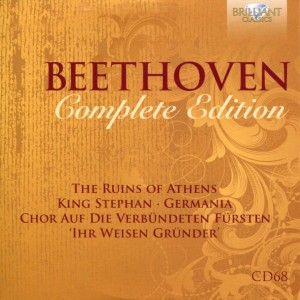 There’s something so satisfying about Beethoven’s music.
There’s something so satisfying about Beethoven’s music.
There are four compositions on today’s CD:
1. The Ruins of Athens
2. King Stephen
3. Germania
4. Chor Auf Die Verbundeten
It gave me a chuckle to see that three of the four titles are in English on the cover of the CD sleeve. But the fourth one isn’t. It’s like whomever was translating either just gave up, or there’s not a concise translation.
For some reason, none of the titles are in English on the back of the CD sleeve. Go figure.
According to its entry on Wikipedia,
The Ruins of Athens (Die Ruinen von Athen), Opus 113, is a set of incidental music pieces written in 1811 by Ludwig van Beethoven. The music was written to accompany the play of the same name by August von Kotzebue, for the dedication of a new theatre at Pest.
A second overture was written in 1822 for the same play. It was composed especially for the reopening of Vienna’s Theater in der Josefstadt in 1822. The second overture is now known as The Consecration of the House.
Perhaps the best-known music from The Ruins of Athens is the Turkish March, a theme that even many who are not avid classical music listeners are familiar with. The overture and the Turkish March are often performed separately, and the other pieces of this set are not often heard[citation needed]. Another of Beethoven’s compositions, Six variations on an original theme, Op. 76, uses the Turkish March as its theme.
And this entry about the Turkish March:
The Turkish March (Marcia alla turca) is a well-known classical march theme by Ludwig van Beethoven. It was written in the Turkish style popular in music of the time.
The theme was first used in Beethoven’s “6 Variations on an Original Theme”, Op. 76, of 1809. In 1811 Beethoven wrote an overture and incidental music to a play by August von Kotzebue called The Ruins of Athens (Op. 113), which premiered in Pest in 1812. The Turkish March appears as item No. 4 of the incidental music. Many music lovers associate the theme with The Ruins of Athens, although that was not its original appearance.
The march is in B flat major, tempo vivace and 2/4 time. Its dynamic scheme is highly suggestive of a procession passing by, starting out pianissimo, poco a poco rising to a fortissimo climax and then receding back to pianissimo by the coda.
The Overture to The Ruins of Athens is amazing. But Track 2 (“Chor: Tochter des machtigen Zeus”) is equally stunning. The voices are heavenly. Gives me goosebumps.
Track 3 (“Duet Ohne Verschulden”) is sublime. The melody is achingly beautiful. It’s so moving to me that I had to share it with my wife. It’s just a small piece of music, starting around the :26 mark and lasting to the :45 or so. Then the baritone picks up the melody.
Track 4 (“Chor der Derwische”) sounds like the soundtrack to an extremely dramatic movie. It’s one of the biggest, boldest, most compelling pieces of music I’ve heard in a long time. It doesn’t just drive forward. It sweeps along everything in its path.
Track 5 (“Marcia alla Turca”) is, indeed, a familiar piece of music. I’ve heard this before. But I had no idea it was Beethoven. To be honest, I can’t fathom the kind of genius it would take to create music like this.
The Ruins of Athens has just become one of my favorite Beethoven compositions. This is exciting, dynamic, multi-layered music that will bear up to repeated listening.
Before I get to the next composition, here are the performers on today’s CD:
Tracks 1-15
N. Starling soprano
Vladimir de Kanel baritone
Berliner Konzertchor
Berliner Symphoniker
Hans Hubert Schoenzeler conductor
Tracks 16 & 17
Florian Prey baritone
Chamber Choir of Europe
European Chamber Soloists
Nicol Matt conductor
According to its entry on Wikipedia, here’s the poop on King Stephen:
King Stephen, Op. 117 (König Stephan) is a commemorative work composed by Ludwig van Beethoven in 1811. It includes an overture in E flat major and nine vocal numbers. Only the overture is usually played today. The title refers to King Stephen I, founder of the kingdom of Hungary in the year 1000.
In 1808 Emperor Francis I of Austria commissioned the construction of a large theatre in Budapest, to alleviate the nationalist feelings incipient in Hungary and to celebrate the loyalty of Hungary to the Austrian monarchy. At the time of the inauguration of this theatre in 1811, Beethoven was commissioned to put to music two commemorative texts written by August von Kotzebue: King Étienne and Ruins of Athens. These overtures are among the least played orchestral works of the composer.
For some reason, King Stephen doesn’t resonate with me the way The Ruins of Athens did. It’s well-crafted music. It just doesn’t move me.
Neither do the last two compositions, which are an aria and a piece for choir. Both are bold, brash pieces of music. Electrifying, even. They’re just not my cup of tea.
